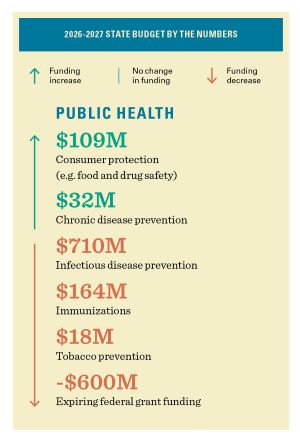
As the 2025 legislative session got underway, the largest measles outbreak in Texas since 2000 dominated the headlines. So, when Texas Medical Association physicians advocated for vaccination, legislators were more cognizant of the stakes involved than in previous sessions.
“Some legislators clearly recognized the outbreak was a real-time example of the scenarios that unfold when we weaken vaccine policy,” said Lauren Gambill, MD, a member of TMA’s Committee on Child and Adolescent Health who testified on vaccine bills throughout the session. “This was not a theoretical conversation – it was reality. And it was a wake-up call staring lawmakers in the face.”
However, hesitancy surrounding vaccines – reflected in some of the bills introduced – necessitated TMA voices to provide medicine’s perspective in testimony and in answering legislators’ questions, whether in public hearings or personal visits to their Capitol offices.
Those voices helped defeat an increasing number of concerning vaccine bills filed for the second session in a row.
“You stick to the science and the data and the evidence, and then also bring it back to the stories of patients we’ve seen and the reason we do this,” Dr. Gambill, an Austin pediatrician, said about TMA’s efforts. “I became a physician because I care about people. I care about kids, and I want to improve the health of our communities. And I truly believe in my heart this is how we do it.”
TMA’s biggest victory on the vaccine front was defeating Senate Bill 95, which would have expanded physicians’ liability – to up to $10,000 per incident – if they failed to obtain an added or redundant layer of informed consent, and in the filed version of the bill, if a child were to experience any “adverse reaction,” even so much as a sore arm.
That bill alone would have done serious damage to disincentivize physicians from providing vaccinations and increase the perceived risk of patients receiving them, Dr. Gambill says.
“By adding legal liability and paperwork, it would feed the perception doctors are trying to hide some risk or danger when it comes to receiving vaccines,” she said. “This was a bill that would have amplified the mistrust we are seeing not only in vaccines, but also in science and medicine more generally.”
Of the roughly 50 vaccine bills filed, only a handful passed, two of which could contribute to physicians’ administrative burden and lower vaccination rates. Starting Sept. 1:
- House Bill 4535 adds another layer to the informed consent process for COVID-19 vaccines. On top of existing state requirements, it mandates physicians obtain written informed consent accompanied by an information sheet specific to COVID-19 vaccines, developed by the Texas Department of State Health Services (DSHS). The COVID-19 vaccine information sheet is available on DSHS’ immunization resources page under vaccine information statements.
- House Bill 1586 allows patients to directly download and print out a school immunization exemption form rather than requesting one from DSHS that includes vaccine educational information. As of this writing, the downloadable school exemption form was expected to be available on DSHS’ vaccine exemption page starting Oct. 1.
Additionally, expiring federal grants eliminated $600 million from DSHS’ budget and could affect immunization efforts among other public health priorities. Health officials were still gauging the impact of those reductions as of this writing, at which time the measles outbreak alone was estimated to cost the state in excess of $8 million.

Asserting immunization shouldn’t be just a pediatrician issue, Dr. Gambill says, encouraging physicians from all specialties to continue speaking out for science as they did during this legislative session.
“Vaccines are one of the most effective public health interventions in history,” she said. “Deprioritizing them is a grave mistake.”
TMA also made it a mission to push for stricter oversight and regulation of e-cigarettes as their use becomes more prevalent and dangerous among adolescents. Medicine delivered on that mission this session, after its relentless advocacy resulted in the passage of a trio of bills targeting e-cigarette products and advertising aimed at children.
More than 1.6 million middle and high school students use e-cigarettes in the U.S., per a 2024 Food and Drug Administration study.
Maria Monge, MD, a member of TMA’s Council on Science and Public Health who delivered testimony on e-cigarette legislation during the session, believes the state has taken meaningful steps to curb the numbers in Texas, which has to play catch-up to regulate vaping on par with tobacco products.
“We have compelling data that would say if kids don’t have access, they don’t seek out e-cigarettes unless they’re addicted,” the Austin pediatrician told Texas Medicine. “So, if you take them out of reach, whether that be advertising, whether that be sale, whether that be friends having them – kids are not looking toward them. They’re using them when they are available but not when they’re not available. The more work we can put into just making the access harder, the less likely adolescents are to become addicted.”
The state took the following steps this session, all effective Sept. 1:
- Senate Bill 1316, by Sen. Molly Cook (D-Houston), bans advertising e-cigarettes within 1,000 feet of a church or school, as required for other tobacco products.
- Senate Bill 1313, also by Senator Cook, targets e-cigarette advertising specifically catering to minors – including imitations of trademarks or appearances of “products primarily marketed to minors” or “cartoon-like fictional characters,” per the legislation’s language; and
- Senate Bill 2024, by Sen. Charles Perry (R-Lubbock), prohibits the sale of an array of products designed to resemble common objects like pens and smartphones and potentially appeal to children.
Dr. Monge credited TMA staff for its work on the vaping issue this session.
“Any bill that came up around health risks of e-cigarettes, we were there crafting and delivering testimony,” she said. “Our public health team did a great job putting things together. Our level of engagement is quite high around this particular issue.”
She also credited TMA’s leadership role within the Texas Public Health Coalition, which she chairs. The group of more than 30 health professional and health-focused organizations, dedicated to disease prevention and health promotion, plays a vital role in garnering support from legislators given what she terms the dangers and the “significant addictive potential” of vaping.
Per TMA testimony, the nicotine present in most e-cigarette products “disrupts neural development and negatively affects attention, learning, and impulse control in adolescent brains,” potentially resulting in “lasting changes in brain function, which increases the risk of lifelong addiction and exacerbates mental health issues.”
Dr. Monge also believes the Texas Legislature’s prioritizing of Senate Bill 25, by Senator Kolkhorst, chair of the Senate Committee on Health and Human Services, contributed to legislators being receptive to e-cigarette bills.
That bill, which TMA also testified in favor of, promotes healthier living and reducing chronic disease by improving nutrition and physical activity for Texans, especially in schools, effective Sept. 1. It also mandates CME in nutrition and metabolic health for all licensed physicians, although it remains unclear how often. The Texas Medical Board must adopt rules by Dec. 31, 2026.
Last Updated On
December 08, 2025
Originally Published On
August 27, 2025
Phil West
Associate Editor
(512) 370-1394
phil.west[at]texmed[dot]org

Phil West is a writer and editor whose publications include the Los Angeles Times, Seattle Times, Austin American-Statesman, and San Antonio Express-News. He earned a BA in journalism from the University of Washington and an MFA from the University of Texas at Austin’s James A. Michener Center for Writers. He lives in Austin with his wife, children, and a trio of free-spirited dogs.